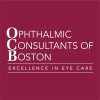
Safety and Efficacy of Switching From Aflibercept to Ranibizumab in Patients With nAMD
Neovascular Age-related Macular DegenerationAMD (Age Related Macular Degeneration) is the leading cause of severe visual loss and blindness registration in the UK . It is a disease which affects the retina (the nerve and blood vessel network at the back of the eye responsible for vision). Patients can suffer with severe visual loss and have difficulties with every day tasks such as recognising faces, reading & driving. There are two variations of the disease, a 'dry' type & a 'wet' type also known as neovascular AMD (nAMD). In wet/nAMD new vessels grow from the blood supply underneath the retina, in part due to higher than normal levels of a protein called Vascular Endothelial Growth Factor (VEGF). Since the introduction of drugs which block VEGF, visual outcomes for patients with wAMD have dramatically improved. There are 2 widely used treatments; ranibizumab and aflibercept. Whilst the majority of patients have a successful outcome with treatment, many patients experience suboptimal response. This study evaluated if these patients experience a benefit from a switch to a different antiVEGF drug treatment. In this study nAMD patients who are showing no or poor to response to treatment with aflibercept were switched to ranibizumab to assess if there is any benefit in terms of treatment outcomes. Patients visited the hospital clinic 8 times over the 7 - 8 month study period. Monthly ranibizumab injections were given for the first 3 months, then monthly as required for the next 3 months.

A Safety Study of CNTO 2476 in Patients With Age-Related Macular Degeneration
Age-related Macular DegenerationThe main purpose of this study to evaluate the safety and tolerability of CNTO 2476 administered subretinally (beneath the retina) using the iTrack Model 275 micro catheter in patients with visual acuity (acuteness or clearness of vision) impairment associated with the geographic atrophy (GA: partial or complete wasting away of retinal layer below the retina) manifestation of age-related macular degeneration (AMD: medical condition which usually affects older adults and results in a loss of vision in the center of the visual field [the macula] because of damage to the retina).

Clinical Study to Investigate Safety and Efficacy of GSK933776 in Adult Patients With Geographic...
AtrophyGeographicThe purpose of this study is to determine the safety and efficacy of GSK933776 in the treatment of geographic atrophy secondary to age-related macular degeneration.

Safety and Efficacy of a New Treatment as Adjunctive Therapy to Anti-vascular Endothelial Growth...
Choroidal NeovascularizationAge-Related MaculopathyThe study will evaluate the safety and efficacy of the intravitreal implant of dexamethasone with Anti-VEGF treatment vs. Anti-VEGF alone (with sham dexamethasone injection) in patients with subfoveal choroidal neovascularization secondary to age-related macular degeneration.

Safety Study of Ranibizumab Eye Injections to Treat Choroidal Neovascularization That Was Caused...
Choroidal NeovascularizationThe purpose of this study is to determine whether ranibizumab is effective in the treatment of choroidal neovascularization secondary to causes other then wet macular-degeneration.

Study of Fenretinide in the Treatment of Geographic Atrophy Associated With Dry Age-Related Macular...
Geographic AtrophyDry Age Related Macular DegenerationThe purpose of this phase II study is to determine the efficacy of fenretinide in the treatment of geographic atrophy (GA) in subjects with the dry form of age-related macular degeneration (AMD).

Study Comparing Ranibizumab Monotherapy With Combined Verteporfin Therapy in Subfoveal CNV
Choroidal NeovascularizationAge-Related Macular DegenerationThis pilot study is designed to evaluate the safety and efficacy of intravitreal ranibizumab used in combination with verteporfin photodynamic therapy (Visudyne®) compared to ranibizumab monotherapy for the treatment of subfoveal CNV secondary to AMD

Reduced Fluence Photodynamic Therapy (PDT) With Visudyne in Combination With Lucentis for Age-Related...
Age-Related MaculopathyChoroidal NeovascularizationIn this pilot study the researchers will evaluate the safety and efficacy of 50% reduced fluence PDT combination therapy with ranibizumab. The researchers hope to gain information regarding the use of reduced fluence PDT combination therapy. The information gained from this pilot study may prompt further definitive studies comparing the safety and efficacy of both standard fluence PDT combination therapy, reduced fluence PDT combination therapy, and ranibizumab monotherapy. The study will compare the use of combination therapy with ranibizumab and verteporfin PDT to ranibizumab alone in patients with exudative age-related macular degeneration (AMD). All patients will receive three consecutive monthly treatments with ranibizumab. Patients will be randomized 1:1:1 to 3 groups. Patients randomized to group 1 will receive only ranibizumab. Patients randomized to group 2 will also receive one treatment with reduced fluence (50% fluence) verteporfin PDT at day 0. Patients randomized to group 3 will also receive one treatment with standard fluence verteporfin PDT. All patients will also be evaluated for possible retreatment with ranibizumab and verteporfin PDT according to established criteria. Thirty patients will be recruited from one U.S. sites. Randomization will occur at the time of entry into the study. Follow-up will continue until month 12 (from day 0) in all subjects.

Reduced Fluence Visudyne-Anti-VEGF-Dexamethasone In Combination for AMD Lesions (RADICAL)
Choroidal NeovascularizationMacular DegenerationThe objective of this study is to determine if combination therapy (reduced-fluence Visudyne followed by Lucentis [within 2 hours] or either of two regimens of reduced-fluence Visudyne followed by Lucentis-Dexamethasone triple therapy [within 2 hours]) reduces retreatment rates compared with Lucentis monotherapy while maintaining similar vision outcomes and an acceptable safety profile.

A Safety and Efficacy Study of E10030 (Anti-PDGF Pegylated Aptamer) Plus Lucentis for Neovascular...
Age-Related Macular DegenerationThe objectives of this study are to evaluate the safety and efficacy of E10030 intravitreous injection when administered in combination with Lucentis® against a control of Lucentis® alone in subjects with subfoveal choroidal neovascularization secondary to age-related macular degeneration (AMD).
